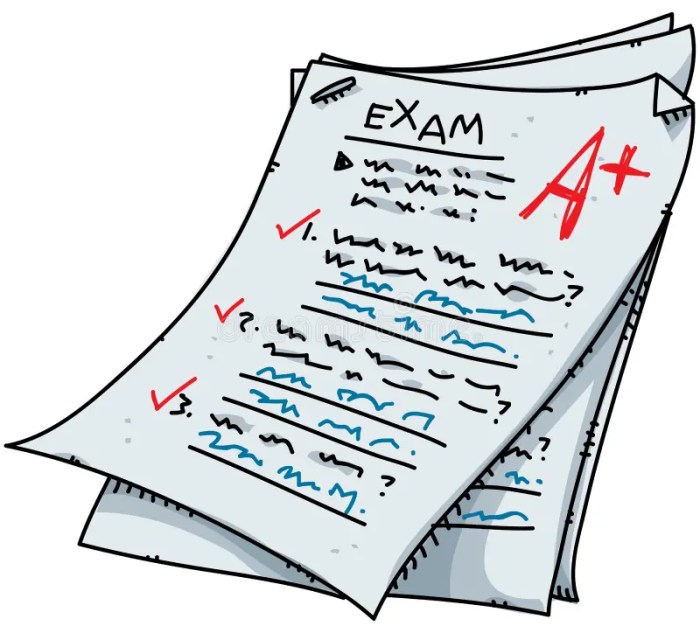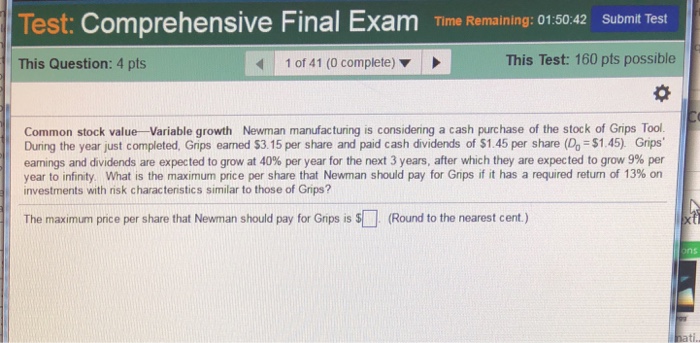Embark on a journey to conquer the final exam for IS 100 C! This guide provides an in-depth exploration of exam strategies, key concepts, time management techniques, and post-exam analysis. Prepare to excel with confidence and unlock your academic potential.
The subsequent paragraphs will equip you with valuable insights, tips, and resources to navigate the exam effectively.
Exam Overview
The final exam for IS 100 C is a comprehensive assessment of your understanding of the course material. It is designed to evaluate your knowledge of the key concepts, theories, and practices covered throughout the semester.
The exam will consist of a combination of multiple-choice questions, short answer questions, and essay questions. You will have 2 hours to complete the exam, and it will be worth 50% of your final grade.
Grading Criteria
- Multiple-choice questions: Each question is worth 1 point.
- Short answer questions: Each question is worth 5 points.
- Essay questions: Each question is worth 10 points.
Exam Preparation Strategies

To ace your IS 100 C final exam, effective preparation is key. This involves not only understanding the course material but also developing efficient study methods and organizing your resources effectively.
Study Methods
Here are some proven study methods that can help you retain information and perform well on the exam:
- Spaced repetition:Review the material at increasing intervals (e.g., 10 minutes, 1 hour, 1 day) to strengthen your memory.
- Active recall:Test yourself on the material without looking at your notes. This forces your brain to retrieve the information, improving your retention.
- Chunking:Break down large amounts of information into smaller, manageable chunks. This makes it easier to digest and remember.
- Visual aids:Create mind maps, diagrams, or flashcards to help you visualize and connect concepts.
Organization and Review, Final exam for is 100 c
Proper organization and review of course materials are essential for effective exam preparation:
- Note-taking:Take clear and concise notes during lectures and readings. Focus on key concepts, definitions, and examples.
- Textbook review:Regularly review your textbook to reinforce your understanding of the material. Pay attention to chapter summaries, key terms, and practice questions.
- Class slides:Use lecture slides as a supplement to your notes. Highlight important points and add additional notes as needed.
- Practice questions:Solve as many practice questions as possible. This helps you identify areas where you need more review and familiarizes you with the exam format.
Resources for Practice
In addition to the course materials, consider these resources for additional practice:
- Online practice questions:Websites like Quizlet and Study.com offer a wide range of practice questions for IS 100 C.
- Mock exams:Take mock exams to simulate the actual exam experience and identify areas for improvement.
- Office hours:Attend office hours to ask questions and clarify any concepts you may be struggling with.
Key Concepts and Topics

The IS 100 C course covers a wide range of essential concepts and topics related to information systems, technology, and their impact on business and society. These concepts are organized into a logical structure to provide a comprehensive understanding of the field.
The following list presents the key concepts and topics covered in the course, along with a brief overview of each:
Information Systems and Technology
- Definition and characteristics of information systems
- Types of information systems and their applications
- Hardware, software, and networks
- Data management and databases
Information Systems Development
- Systems development life cycle
- Requirements gathering and analysis
- System design and implementation
- Testing and deployment
Information Systems Management
- Planning and managing information systems
- Security and risk management
- Ethical and legal issues
- Information systems strategy
The Impact of Information Systems
- Transforming business processes
- Improving decision-making
- Enhancing customer service
- Ethical and societal implications
Time Management Strategies

Effective time management is crucial for success in any exam. This is especially true for exams like IS 100 C, where you’re faced with a timed environment and a comprehensive range of topics.
To maximize your performance, it’s essential to develop a solid time management strategy that allows you to allocate time wisely, stay focused, and avoid distractions throughout the exam.
Prioritize and Allocate Time Wisely
Before starting the exam, take a few minutes to review the entire question paper and identify the sections that carry the highest weightage. This will help you prioritize which sections to focus on and allocate your time accordingly.
Remember, it’s better to spend more time on the sections that will yield the most marks rather than getting bogged down on smaller or less important questions.
Manage Your Pace
Once you start the exam, it’s important to maintain a steady pace and avoid rushing through questions. Take your time to read and understand each question carefully before attempting to answer it.
If you find yourself spending too much time on a particular question, don’t hesitate to move on and come back to it later if time permits.
The final exam for IS 100C is coming up, and I’m feeling a little nervous. I’ve been studying hard, but I can’t help but feel like I’m forgetting something. Maybe I should check out some words with m o d e l u . That might help me remember some of the key concepts.
After all, the final exam for IS 100C is worth a lot, and I don’t want to mess it up.
Minimize Distractions
During the exam, it’s easy to get distracted by various factors such as noise, movement, or even your own thoughts. To minimize distractions, try to find a quiet and comfortable place to take the exam.
Consider using noise-canceling headphones or earplugs to block out external noise. It’s also helpful to take short breaks throughout the exam to clear your head and refocus.
Additional Tips
- Practice time management strategies beforehand by taking timed practice tests.
- Familiarize yourself with the exam format and question types to avoid surprises.
- Stay hydrated and take breaks as needed to maintain your focus.
- Don’t be afraid to ask for clarification from the examiner if you’re unsure about a question.
Exam-Taking Techniques
Exam-taking techniques can significantly impact your performance on the final exam. This section provides strategies for answering different types of exam questions, approaching complex questions, and writing clearly and concisely.
By following these techniques, you can increase your chances of success and demonstrate your understanding of the course material.
Multiple Choice Questions
- Read the question carefully and identify the key concepts.
- Eliminate any options that you are certain are incorrect.
- If you are unsure of the answer, make an educated guess based on the information provided.
Short Answer Questions
- Answer the question directly and concisely.
- Use specific examples and evidence from the course material.
- Write in complete sentences and proofread your answer before submitting it.
Essay Questions
- Organize your thoughts before you start writing.
- Develop a clear thesis statement that addresses the question.
- Provide supporting evidence from the course material and explain your reasoning.
- Write in a logical and coherent manner, using transitions to connect your ideas.
Approaching Complex Questions
- Break down the question into smaller parts.
- Identify the key concepts and information that is relevant to the question.
- Use a step-by-step approach to solve the problem.
- If you are unsure of how to answer the question, ask for clarification from the instructor.
Writing Clearly and Concisely
- Use precise language and avoid unnecessary words.
- Organize your thoughts and ideas logically.
- Proofread your answers before submitting them to ensure that they are clear and error-free.
Exam Resources
To ensure your success in the exam, the department provides a range of resources and support systems.
These resources include tutoring services, office hours, and online forums where you can connect with peers and instructors for assistance.
Tutoring Services
- Free tutoring sessions are available on a drop-in basis or by appointment.
- Tutors are knowledgeable and experienced students who can provide personalized guidance and support.
Office Hours
- Instructors hold regular office hours where you can ask questions, clarify concepts, and receive feedback.
- Office hours are an excellent opportunity to connect with the instructors and get personalized assistance.
Online Forums
- Online forums are available where you can connect with peers and instructors.
- These forums provide a platform for discussions, Q&A, and sharing of study materials.
Teaching Assistants
- Teaching assistants (TAs) are available to assist you with the course material and exam preparation.
- TAs can provide guidance on study strategies, review materials, and answer questions.
Post-Exam Analysis

Reviewing an exam after taking it is a crucial step in the learning process. It provides an opportunity to reflect on your performance, identify areas where you excelled and areas where you need improvement, and use this information to enhance your understanding and prepare for future assessments.
Identifying Areas of Strength and Weakness
- Compare your answers to the answer key or grading rubric to determine which questions you answered correctly and incorrectly.
- Analyze the questions you answered correctly to identify the concepts and skills you have a strong grasp of.
- Focus on the questions you answered incorrectly to pinpoint areas where your understanding is lacking or where you need additional practice.
Using Exam Results to Improve Understanding and Prepare for Future Assessments
- Review the course materials related to the topics where you struggled to reinforce your understanding.
- Seek clarification from your instructor or classmates on concepts that you did not fully comprehend.
- Practice additional problems or review relevant materials to strengthen your grasp of the challenging areas.
- Identify patterns in your mistakes to determine if there are any underlying issues, such as time management or test-taking anxiety.
General Inquiries: Final Exam For Is 100 C
What is the duration of the IS 100 C final exam?
The exam duration may vary depending on the specific course schedule. Please refer to your course syllabus or consult with your instructor for precise information.
Are there any practice questions or mock exams available?
Yes, it is recommended to seek out practice questions and mock exams to enhance your preparation. Your instructor may provide these materials, or you can explore online resources and textbooks for additional practice.